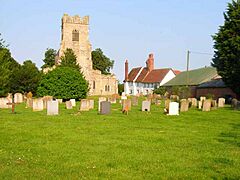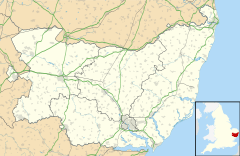Groton, Suffolk facts for kids
Quick facts for kids Groton |
|
|---|---|
 St Bartholomew's Church, Groton |
|
| Area | 6.239 km2 (2.409 sq mi) |
| Population | 299 (2021 census) |
| • Density | 48/km2 (120/sq mi) |
| Civil parish |
|
| District |
|
| Shire county | |
| Region | |
| Country | England |
| Sovereign state | United Kingdom |
| Post town | Sudbury |
| Postcode district | CO10 |
| EU Parliament | East of England |
| UK Parliament |
|
Groton is a small village in Suffolk, England. It is located in the Babergh area, about one mile north of the A1071 road. This road connects the towns of Hadleigh and Sudbury. In 2021, about 299 people lived in Groton.
The village has a church called Saint Bartholomew's. It is built with flint and has some parts from the 1400s. The church was greatly repaired in the 1800s. It is also a special place for war graves. Groton does not have any shops, but it does have a pub called the Fox and Hounds.
Groton parish includes several smaller areas called hamlets. These are Broad Street, Castling's Heath, Gosling Green, Horner's Green, and Parliament Heath. The area is also home to several old forests. These include Groton Wood, which is a special protected area for nature. There are also Mill Wood and Winding Wood nature reserves. A small part of Bull's Cross Wood is also in the parish. A small stream that flows into the River Box is also found here. You can also find the remains of an old wooden castle called Pitches Mount.
Groton shares its borders with other villages like Boxford, Edwardstone, Kersey, Lindsey, and Milden. There are 21 buildings in Groton that are officially protected because of their history or special design.
Contents
History of Groton
The name "Groton" means 'Sandy or gravelly stream'. This tells us about the type of land it has. In 1086, Groton was written about in the Domesday Book. This was a very old survey of England ordered by William the Conqueror. It was called Grotena back then.
The land of Groton first belonged to the Abbot of Bury St Edmunds. An abbot is the head of a monastery. Later, when monasteries were closed down, the land was given to the Winthrop family.
The Winthrop Family Connection
Groton, Massachusetts, a town in the United States, was named after this village. This happened because a member of the Winthrop family founded it. John Winthrop was born in Groton Manor in 1587. He became a very important leader. He led a group of settlers to America and helped start the city of Boston. He was also one of the first governors of the Massachusetts Bay Colony. The village church has a special stained glass window that remembers him.
Another American town, Groton, Connecticut, was also named after this village. John Winthrop's son, John Winthrop the Younger, settled there in 1646. In Groton village, there is an old Mulberry tree on a common area called "The Croft." People say that Adam Winthrop, John the elder's grandfather, planted this tree.
There are other places in the United States named Groton. Most of these were named after the town in Massachusetts.
Local Government Changes
In 1894, Groton became part of the Cosford Rural District. This district then became part of West Suffolk county in 1889. Later, in 1974, Groton became part of the Babergh district in Suffolk.
Pitches Mount Castle
In Groton Park, you can find Pitches Mount, also called Pytches. This is an example of a Norman motte and bailey castle. These castles were built a long time ago, often in the 1100s. It might have been built by Adam de Cockfield.
Today, only the "motte" or mound of the castle remains. This mound is about 200 feet wide and is covered in bushes. Some people think the name comes from the Pecche family, who owned Groton around 1200. However, it is more likely named after John Pytches. He bought Groton Great House in 1805.
Hamlets of Groton
Groton parish includes several small hamlets.
Broad Street
Broad Street is one of the hamlets in Groton parish. It is located near a place called Mill Green. Pitches Mount, the old castle mound, is also found here.
Castling's Heath
Castling's Heath is another hamlet in the parish. It has a large barn called Castling's Hall. This barn is also known as Dove Barn and is often used for weddings.
Gosling Green
Gosling Green is a hamlet located right next to Groton Wood. Groton Wood is a SSSI, which means it's a protected area because of its special plants, animals, or geology.
Notable People from Groton
Many interesting people have connections to Groton:
- John Winthrop (1587–1649): He was born in Groton. He helped found Boston and was a governor of the Massachusetts Bay Colony.
- John Winthrop the Younger (1606–1676): John Winthrop's son. He became a governor of the Connecticut Colony.
- Elizabeth Fones (1610–1673): An early settler in the Massachusetts Bay Colony. She also helped found Greenwich, Connecticut.
- Deane Winthrop (1623–1704): A colonist who was one of the first settlers of the Nashoba Valley.
- Lord Frederick Beauclerk (1773-1850): A famous cricketer from a long time ago.
- Robert Longden (1817–1895): A church leader and a cricketer.
- Ruth Rendell (1930-2015): A very well-known crime writer who won many awards.
See also
 In Spanish: Groton (Suffolk) para niños
In Spanish: Groton (Suffolk) para niños
 | Jessica Watkins |
 | Robert Henry Lawrence Jr. |
 | Mae Jemison |
 | Sian Proctor |
 | Guion Bluford |


